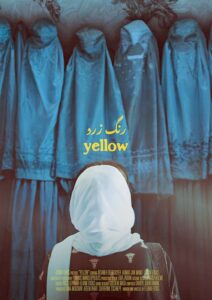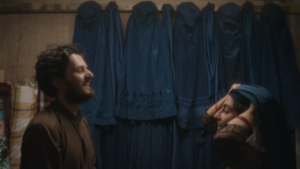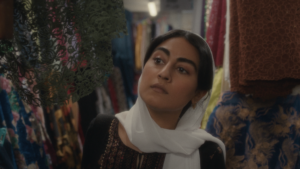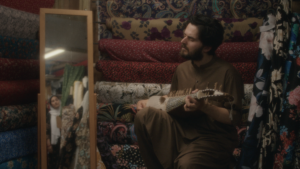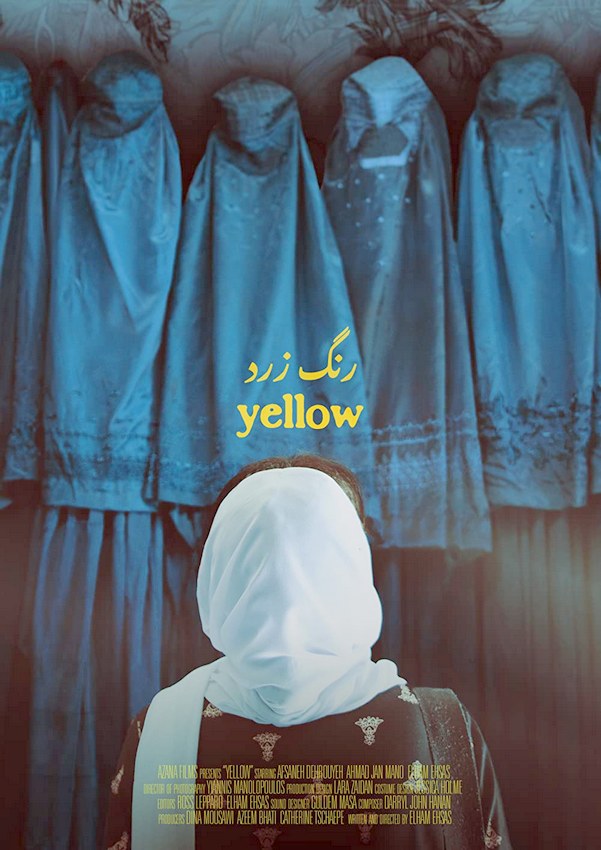
Oscar and BAFTA Qualifying Short Film Review “Yellow”
WATCH THE TRAILER HERE
First, the Recap:
Held back, held down, utterly shackled by the suffocating conventions of a twisted and prohibitive mindset. This would not remotely be the atmosphere anyone would wish to live in or under, having to accept that your place in the culture has now been put in jeopardy, your options officially yanked away, moving forward now an uncertainty. How are you going to face it while aiming to maintain who you are? In Kabul, Afghanistan, Laili (Afsaneh Dehrouyeh) is confronting this precise scenario as the Taliban-controlled country has now put their mandates into effect, causing her to have to shop for her very first full body veil that is required for all women to wear. As she pursues the store, the unexpected occurs–a connection with the store’s sales clerk (Elham Ehsas) who has his own form of (somewhat) quiet rebellion that matches her own, a moment of realizing the colors that make up life as it should be.
Next, my Mind:
It feels like a foregone conclusion that we here in the United States take our freedoms for granted. Born and raised under the banner of these amazing privileges that allow for us to express ourselves, move from State to State without any true restriction, dress as we deem prudent, and ideally cultivate an atmosphere that will embrace all cultures, creeds, genders, ethnicities, colors, orientations, etc with at minimum a semblance of unified respect towards each other as human beings. Yet, when we say we are now experiencing resurgences of intolerance, hatred, anger, racism, and political polarization, we of course see this as so overtly disruptive that the focus on healing and CHANGE is what comes to the forefront. But what if you were residing where the newly applied rules are immovable to the point of potentially violent repercussions and/or assured banishment from society? For this critic, this is precisely what we’re being explored through this 12-minute short film from writer/director/producer/editor Elham Ehsas, producers Azeem Bhati, Dina Mousawi, and Catherine Tschaepe, and producer/cinematographer Yiannis Manolopoulos that had its North American Premiere June 21 at the 2023 Palm Springs International ShortsFest and has now qualified for 2023 Oscar and BAFTA consideration.
Set in the timeframe of the Taliban’s takeover of Afghanistan which began in 1996, the film’s narrative sees a young woman in the capital city of Kabul facing the true ambiguity of her place in the current moment and for the future when the new ruling powers decree all women must observe hijab and wear full body veils when in public, something she has never been required to do, leading to the subsequent encounter she has with the Chadari store clerk who assists her. But what I loved about this film is that while this IS the basic foundational premise we’re delivered, it’s what occurs in the MIDST of this process that breathes amazing life into events as it soon transforms into the unanticipated bonding between two people who, by specific means they have chosen to (mostly discreetly mind you), share a mutual desire to simply BE who they really are in spite of the stifling new regime that’s taken over their reality. It’s this cornerstone concept of EXPRESSION that lays a totally beautiful and heartening facet to the narrative as it unfolds. Additionally, how this is offered through a deftly conceived mix of drama and mildly comedic flourishes really enhances the relatability this narrative presents.
While the wider-ranging thematic forays clearly delve into the generational, cultural/societal traditions and customs of the predominant religious beliefs/directives being put into practice along with the existing discriminatory/repressive outlook towards women, the exceptionally creative, artistic manner in which the film covers the notions of seeking self-identity, experiencing the vibrancy and color (both literal and figurative) of life itself, reveling in moments that so deftly DEFINE us, and illustrating the potent strength of the human will TO stand out and up to that which attempts to wrongly hold it back are just so uplifting and affecting in their intent and placing over the course of the narrative’s abbreviated runtime. There are some excellently stirring sequences between the two lead characters that speak to these ideas with such subtle yet profound power to things that are both awkward and alluring, and it cements what this critic felt was the other core purpose being conveyed–we NEED these instances of connection to remind us what it is to exist the way it should be.
Dehrouyeh elicits such an endearing sense of charm, inner fortitude, and quietly bold demeanor of unwavering independence that makes her performance here so beautifully apropos for her role here as Laila, a woman having to discover a way to devotedly affirm the newly implemented sanctions being pressed upon her and her country by the Taliban when the requirement for wearing a full body veil has been advised. Yet, even as she peruses the monochrome selections there are, her initial notice of then proceeding interactions with the store clerk open an unforeseen span of time where their mutually shared interests to go against the change in their actualities rises up, turning into a freeing, dynamic, calmly hesitant, eye-opening, and even humorous learning experience and illustration of respective passions for them both that transcends it all. Dehrouyeh navigates her character so credibly through this shifting air of newfound association that speaks volumes of soaring beyond the disquiet of what things will be like now and moving forward. A wonderful performance.
Likewise, filmmaker Ehsas steps out from behind the lens and makes his presence known with a very similar degree of grounded charisma and effectively understated energy through his role as the store clerk who quickly learns there’s more to Laila that meets the eye when she begins to talk of colors, much less in English (an interesting nod to the fact that women’s pursuit of education is totally subdued), which inexorably piques his curiosity when the initial astonishment wears off. Having moments before this seen his own style of resistance to the powers that be and which grabs Laila’s attention, he ends up relishing this new bond even as he must try and help her ascertain the garment she needs, even to the extent of explaining how its worn. Their chemistry as PEOPLE, and even as a man and woman, is refreshingly evident in the face of the unknown they face ahead, and Ehsas’ “everyman” approach and undisguised affability his character exudes brings allows this pairing to work extremely effectively for the story.
Supporting appearances are made by Ahmad Jan Mano as the Chadari store owner who is not quite pleased with his employees habits to bending rules that could ruin the shop if he’s caught, along with Habibullah Safi, Junked Tariq, Waseem Butt, Hunain Khan, and Shazaib Tariq. So, in total, “Yellow” is an intelligent, well-executed examination of conformity, defiance, forced change, and individuality vs. mundane sameness that also addresses the suppression of an entire gender and, in doing so, honestly makes us all hope that even the most rigid of belief can be tempered with understanding that benefits ALL who choose to adhere to it rather than allowing it to be that which extinguishes the means to at least relate to ALL people, unimpeded, on that essential, fundamental level–together.
STAR RATING (out of 5):
As always, this is all for your consideration and comment. Until next time, thank you for reading!
